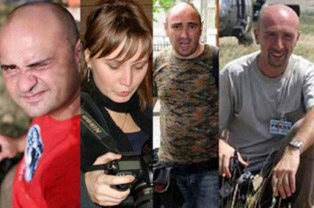EurasiaNet's Weekly Digest
President Mikheil Saakashvili’s administration is taking a hit over the abrupt end of a photographer/spy saga in Georgia. Many journalists feel shortchanged on the facts of the case, while foreign allies, in particular the United States, are reportedly growing weary of the Georgian government’s fixation on Russian spies.
A plea bargain on July 22 secured the release of three photographers arrested in connection with the scandal -- Irakli Gedenidze, who served as Saakashvili’s personal photographer, Giorgi Abdaladze, a freelance photographer for the Foreign Ministry, and Zurab Kurtsikidze, a photographer for the European Pressphoto Agency. Gedenidze’s wife, Natia, a newspaper photographer who had been charged with acting as an accessory, also closed the book on her case with a plea bargain. The four were taken into custody on July 7.
The hasty resolution to the spy case left many questions unanswered. Outside the courthouse, the photographers met with a reception that ranged from supportive to chilly and reserved, mirroring the fault lines among Georgian media outlets that have appeared over the case.
Staunchly anti-government journalists, who never accepted the premise of Gedenidze’s, Abdaladze’s and Kurtsikidze’s guilt, gave the trio a hero’s welcome upon release. One of Abdaladze’s former media employers even offered to hire the photographer back.
Some journalists attributed such displays to political bias. “The photographers got their freedom and a mild punishment in exchange for cooperating with the investigation,” said Davit Paichadze, dean of Ilia Chavchavadze University's Journalism School and a talk-show host on Georgia’s government-friendly public television. “Nobody needs them in prison now. … Their reputation has suffered seriously and, I think, they deserved it.”
Abdaladze himself commented bitterly in a newspaper interview that his only career option now is taking photos of weddings and birthdays. The Ministry of Foreign Affairs has rejected any possibility of rehiring the photographer.
Meanwhile, middle-of-the-road voices in Georgian journalism say they have been vexed by the lack of substance to the story. “Once more we are in a situation where personal views, not hard facts, shape the media discourse,” said Liberali news weekly journalist Ninia Kakabadze. “We are left with a situation where one side sticks to a preconceived trust in [the photographers’] innocence, the government supporters are convinced of their guilt, but those of us who need hard facts to make a judgment are left with nothing.”
As part of their plea deal with the government, the photographers agreed not to discuss their cases. Documents released by prosecutors were heavily redacted, leaving the public to mull over a mix of hearsay and pieces of inconclusive evidence.
“The government, quite irresponsibly, left us with the only option -- to guess our way to what happened there, which is a fool’s game,” said Kakabadze, who questioned whether the failure to make good on the promise for a public trial meant that “the prosecution just did not have enough evidence to show.”
Besides self-incriminating statements made Gedenidze, Abdaladze and Kurtsikidze, evidence against the photographers included copies of blueprints of the president’s office, a presidential itinerary and minutes of top-level meetings found on the three men’s computers.
Some reporters who took part in a series of protests over the arrests claim that the photographers’ coverage of the brutal May 26 clash between police and protesters in Tbilisi sparked the investigation. Photos of the crackdown taken by Gedenidze and Abdaladze, both government employees, were sold to international wire agencies. Government representatives, however, vehemently dismissed such allegations, terming them an “irresponsible” misrepresentation of the theft of “state secrets” by “government functionaries.”
“Images and coverage of May 26 were, of course, not pleasant for the authorities, but a whole slew of international and local outlets have freely covered that and many other events that did not put the Georgian government in the best light internationally,” said National Security Council Secretary Giga Bokeria. “So what’s the logic of targeting the president’s own photographer, of all people?”
Bokeria also rejected claims that the photographers’ confessions were extracted under duress; the statements were made in the presence of lawyers and were repeated in an open hearing, he said.
Georgian counterintelligence officials first uncovered a connection between the photographers and Russian military intelligence when tracing phone calls between two Russian military officers wanted by Tbilisi on espionage charges, he said. Phone records have been released that present an alleged pattern of phone calls between the two officers and Kurtsikidze.
Doubts about the evidence persisted, however, fueled in part because prosecutors and the Interior Ministry declined to release additional facts about the case. One of the phone numbers attributed to an alleged Russian military officer has been traced to a Tbilisi pensioner, who claims no contact with either Kurtsikidze or the Interior Ministry.
The Interior Ministry claims the photographers gave them additional information that implicates other supposed collaborators with Russian intelligence. Officials hint that additional arrests will take place “in the near future.”
One prominent Caucasus analyst, though, notes that fatigue is growing within Georgia’s closest ally, the US government, for Tbilisi’s ongoing Russian spy cases. Claims of Moscow stalking President Saakashvili and sponsoring terrorism within Georgia do not sit nicely with Washington’s Russia reset policy, commented Thomas de Waal, a senior associate in the Carnegie Endowment for International Peace’s Russia and Eurasia Program.
Some in President Barak Obama’s administration “say that the Georgians should raise these issues much more quietly with their Western friends and not trumpet them in the media and should not show transcripts and confession on national television,” de Waal added.
In response, Bokeria said that Tbilisi would welcome closer ties between Russia and the West, but stressed that Georgia cannot stay silent if it feels that Moscow does not respect its sovereignty.
Original Text




